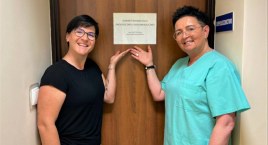Physiotherapy is more than just rehabilitation. How does it help in everyday life?

Many people still associate physiotherapy solely with rehabilitation after accidents, fractures, or surgeries. However, the scope of physiotherapists' work is much broader – they support patients with chronic illnesses, help combat back pain, teach preventative care, and improve the quality of life for seniors. We take a closer look at how their work impacts our daily health.
Just a dozen or so years ago, patients primarily consulted physiotherapists after an injury, a serious fracture, or surgery. Physiotherapy was considered a step in "recovery." Today, it is increasingly discussed in the context of preventative care, and physiotherapists are seeing individuals seeking to prevent health problems, not just treat them.
The best example is a sedentary lifestyle – hours spent at a computer and a lack of exercise lead to strain, poor posture, and ultimately, chronic back pain. Properly selected exercises and regular work with a physiotherapist can halt this process and even reverse its effects.
Physiotherapy doesn't end with treating injuries. It's also an integral part of treating many chronic illnesses. Patients with chronic obstructive pulmonary disease (COPD) learn breathing exercises that improve their physical fitness. Those who have suffered heart attacks or circulatory failure benefit from cardiac rehabilitation, which increases their chances of a longer and healthier life.
Physiotherapists also support neurological patients, including those who have suffered from stroke, Parkinson's disease, or multiple sclerosis. In each of these cases, the goal is not only to improve mobility but also to restore independence and reduce the risk of complications.
Polish society is aging rapidly, and seniors are increasingly seeking support to maintain their fitness. Geriatric physiotherapy focuses on helping older adults maintain their independence for as long as possible. Balance exercises, age-appropriate strength training, and manual therapy can reduce the risk of falls, which are a leading cause of serious injuries among seniors.
The mental aspect is equally important – regular exercise and contact with a specialist improve mood, reduce the feeling of isolation and give the feeling that despite age, you can still live an active life.
Professional athletes can't imagine functioning without the care of physiotherapists. They ensure the body prepares for training, promotes regeneration, and ensures a rapid recovery from injuries. However, physiotherapy isn't just for athletes. It's becoming equally important in office work – a growing number of corporate employees suffer from so-called overuse syndromes related to long hours of sitting and working at a computer.
Neck pain, stiff shoulders, or numbness in the hands are signs that should prompt a visit to a physiotherapist. Simple exercises and lifestyle changes can help avoid chronic ailments that, over time, can even lead to permanent health problems.
See also:Today's physiotherapy increasingly utilizes new technologies. In addition to traditional manual methods and exercises, patients have access to modern solutions: rehabilitation robots that help them learn to walk after stroke, and virtual reality therapy.
Telemedicine allows for some classes to be conducted remotely, which has proven particularly useful during the pandemic. These innovations make physiotherapy more accessible and effective, and patients recover more quickly.
It's worth remembering that physiotherapy in Poland is a legally regulated medical profession. A person practicing this profession must complete medical studies and possess appropriate qualifications. Importantly, physiotherapists can independently diagnose movement problems, plan therapy, and monitor its effects.
This makes them primary care specialists – alongside family doctors – who can quickly assess the problem and propose an effective solution. World Physiotherapy Day is an excellent opportunity to appreciate their work and recognize that they support patients' health to a much broader extent than is commonly believed.
Updated: 08/09/2025 18:40
politykazdrowotna






